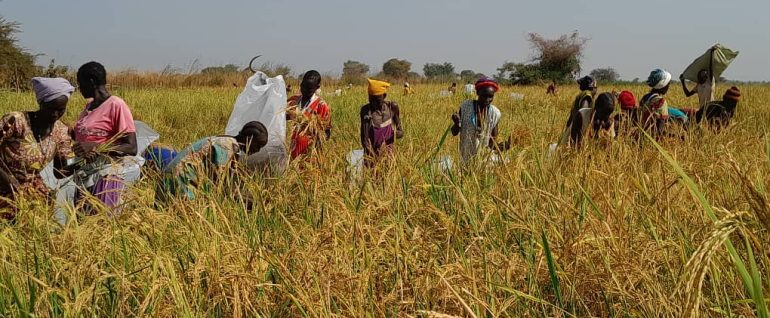A few weeks ago, we spoke to Deng James Bol, about an onion cultivation project he is overseeing for Christians Initiative for Development Aid in South Sudan. The onion project involves over 350 farmers and takes over 500 hectares of land, with the objective of expanding the production to 11,000 hectares.
If you thought this was the only project James was overseeing, you were mistaken. He is overseeing several different projects, and just to remind us of his responsibilities, here are some:
- Ensuring the farms follow the highest standards to achieve high yields and crop quality
- Managing the farm budget, costs, and expenses for farm operations and improvements
- Monitoring crop health and making decisions to address any issues
- Supervising crop planting, maintenance, and harvesting activities
- Maintaining and improving farm infrastructure, equipment, and facilities
In addition to the onion project, James is overseeing a fish farming project, a Beekeeping project, and Rice cultivation project, and a host of other projects directly and indirectly related to agriculture, such as a bricklaying project and a tree planting project.
This time I’ll talk to James about the Bees and the Rice.
“Currently we have 21 people directly working on the Beekeeping project with 180 farmers. The honey is mostly sold outside of the communities, and in that way is a source of much-needed income. Since resources are limited for this kind of project we use very basic wood cylinder-type beehives, and we leave them in places accessible for the farmers. The project is seasonal, and during two periods, March to May, and September to November, the farmers can harvest the honey”, James explains.
What kind of challenges are you facing with the project? “This is a simple project; we do not need much. Mostly getting resources for equipment for the farmers. Protective clothing and tools. Another issue is burning inside the forest”, James adds. “We need to prepare areas for the Beehives and burning does not help. We need machines to cut dead trees to accommodate the hives”.
What about the Rice project, how many farmers are involved and how much land do you have dedicated to the cultivation of Rice? “This is a big project. Rice is an important food, so in addition to selling it, the rice is consumed at the farms as well. All in all, there are over 1,050 hectares used for Rice farming in the area. There are over 1,250 farmers involved in this project, and with their families, the project touches over 6,000 people. The rice project is so impactful that we are now expecting it to add 70,000 hectares of land for rice project in Aweil province, in South Sudan,” James adds. “You see if 1,000 hectares of rice impact 6,000 people, 70,000 hectares will impact 420,000 people. That is a project that not only will change lives, but it will change a region”.
What are your biggest challenges regarding this project? “To grow Rice on a large scale you must do it with machines, tractors, and equipment. We do not have the resources for that, so this is hard labor. Although the climate is good for Rice, especially in the lowlands, with good rain from May to October, our yield is low due to a lack of quality seeds, pest control, fertilizer, storage facilities, and reliable transportation”, James says. “If we would have the capital, we’d tool up, and build irrigation systems and storage facilities”, he adds.
Since time has passed since we spoke to James last time, it is good to review how farmers can become involved in the program. “Christians Initiative for Development Aid South Sudan has workshops and training for all farmers of onions and other crops and tree projects and farmers come there to be trained and educated”, James tells me. “These farmers are self-saving groups of women and men that cultivate their crops and sell some and keep little for home consumption when they get income then they use it for saving and to get microfinance or loans through business plans so that they can grow their business. Christian initiative for Development Aid South Sudan aim is to empower vulnerable groups to manage their own operation”.
In our next posts, we will be following James through the area and looking at the different projects.
Stay put and follow Agri Project Africa for the whole story and other stories like this. Please share James’s story on your platforms.










